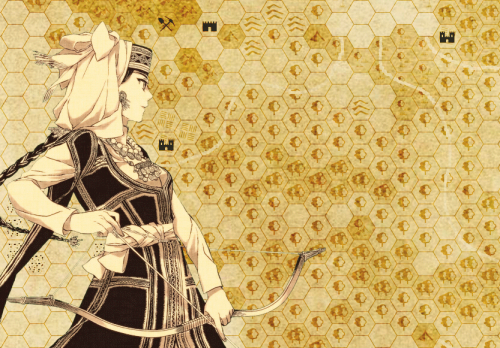Back in the 1980’s I swindled my mom into fronting the money for a series of strange purchases, including a funky red, blue, and green cardboard boxes filled with odd little saddle-stitched books, bizarre dice, and all manner of crazy ideas. In the back of one of these books was a sheet of paper covered with a blank hexagonal graph paper and guidelines for building your own fantastical world. I hadn’t been exposed to Greyhawk or Lankhmar or the Forgotten Realms yet; this was simply how you went about making a world for your evil sorcerers and hobgoblin armies and chromatic dragons to threaten. For other kids to explore. For adventurers to save.
It suggested you start in the middle of the page with the location of your first adventure and its nearest village or city. Fill in the immediate area with some terrain, and expand outward as needed. Sprinkle in some rivers and oceans and mountain ranges, and plant some points of interest as the locations of future adventures and quests and plots and schemes. You’re off to the races.
As I grew up a good portion of how a D&D game unfolded evolved, refined, and perhaps corrupted. Random encounters were ridiculous, as they don’t contribute to the elaborate story the Dungeon Master and players were weaving together. Wandering monster tables were immersion-breaking and had no place in a serious game. Adventure locations should make internal sense. If the original inhabitants didn’t have the resources or motivation to put a giant boulder trap in a hallway, it doesn’t belong there. Giant carnivorous monsters shouldn’t dwell where there are no prey. Monsters and villains should be carefully crafted to ensure the player characters have a solid chance of defeating them in a fight. The plausibility of fantastic treasures must not be compromised by random generation tables.
When I type all that out it becomes clear how hampered the role of Dungeon Master had become. How pampered and stifled the players. No clever 3rd level Fighter was going to accidentally find a +2 Flaming Ranseur. No 10th level party was going to have to run for their lives from an angry dracolich whose lair they accidentally camped in en route to another location, leaving one of their own behind for dead. I’m not sure where the desire to not have a slapstick Monty Hall campaign turned a game of swords and sorcery into Serious Business, but it did. Randomness in a roleplaying game isn’t just a tool for spicing up a success/failure mechanism. It is also an opportunity to force improvisation.
Time to dial it back a bit. Brew up a map with Hexographer. Brew up a few villainous NPCs with bad intentions and some random encounter tables and see what happens. I’m not going full-on OSR, just treating the release of 5th edition Dungeons & Dragons as an opportunity for a clean break and a fresh start.
